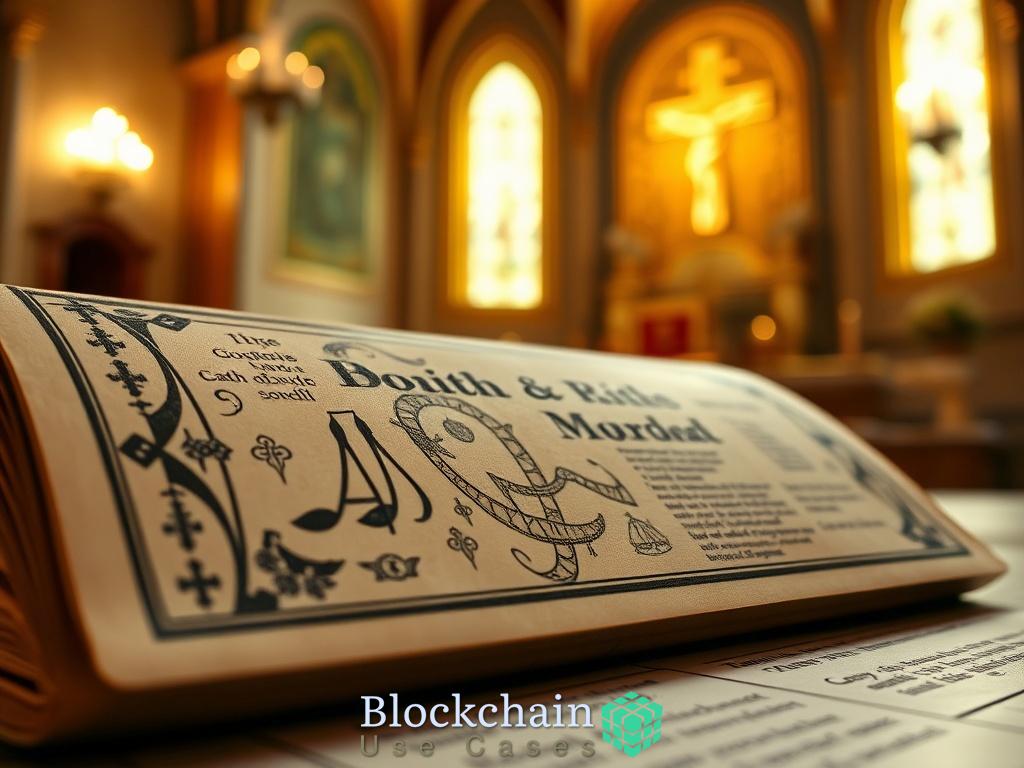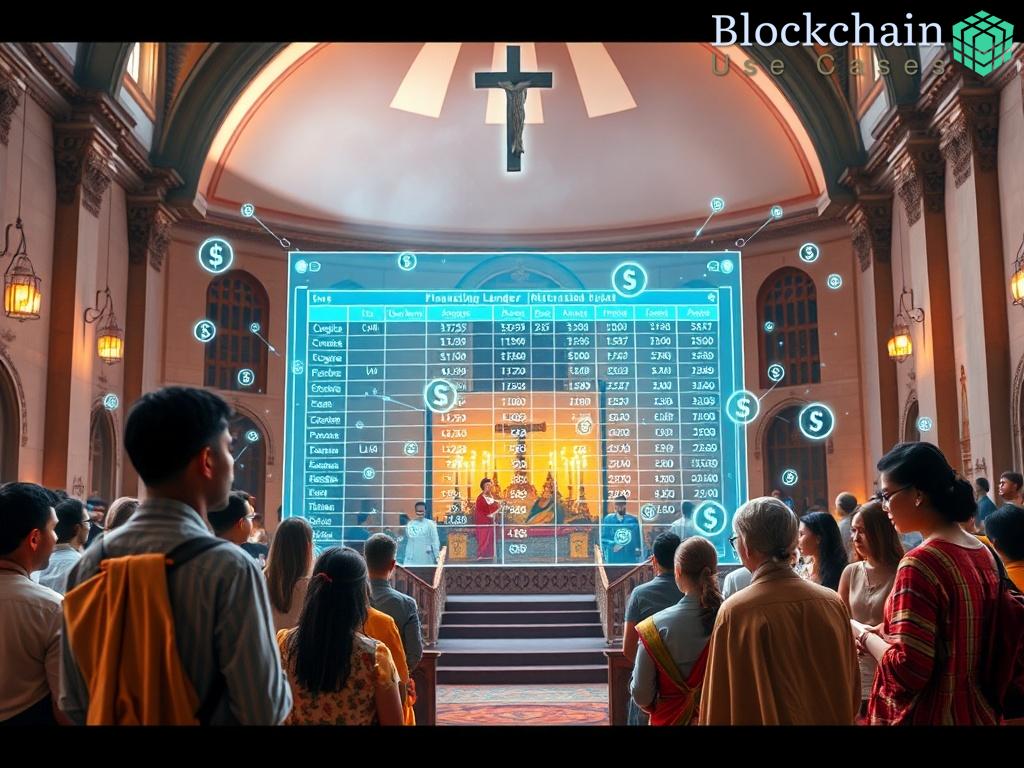Decoding Transparency: How Blockchain Reshapes Financial Trust in Faith

In an age where digital innovation is reshaping every sector, the religious world is not left behind. The essence of faith often lies in trust—trust in leadership, trust in transparency, and trust in the financial stewardship of donations. Blockchain technology, known primarily for its role in cryptocurrency, offers a revolutionary solution to enhance transparency in the financial dealings of religious organizations.
Imagine a world where every donation is tracked, every expenditure is recorded, and every financial decision is transparent. Blockchain allows for a decentralized ledger that ensures every transaction is immutable and accessible. This technology can transform how congregations view their finances, fostering a culture of accountability and openness.
As faith-based organizations often rely on the generosity of their members, the need for a reliable framework to manage finances is paramount. Blockchain technology offers a unique solution by allowing organizations to record transactions in a way that is both secure and transparent.
| Advantages of Blockchain in Religious Finances | Description |
|---|---|
| Transparency | All transactions are recorded on a public ledger, accessible to all stakeholders, significantly reducing the risk of mismanagement. |
| Accountability | Every transaction can be traced back to its origin, ensuring that funds are used for their intended purposes. |
| Security | Blockchain’s encryption methods ensure that financial data is protected against unauthorized access. |
| Decentralization | No single entity controls the blockchain, which minimizes the risk of corruption and misuse of funds. |
By adopting blockchain technology, religious organizations can cultivate a deeper connection with their members, who can see exactly how their contributions are being utilized. This level of transparency not only builds financial trust but also strengthens the community’s faith in their leadership.
The integration of blockchain into the financial practices of religious organizations signifies a paradigm shift. It encourages a culture of transparency that can potentially revolutionize how communities engage with their faith institutions.
With traditional financial oversight often criticized for its opacity, blockchain provides a compelling alternative. The technology enables real-time tracking of funds, ensuring that every donation is accounted for and every dollar is justified. This shift not only enhances trust among congregants but also positions religious organizations as pioneers in ethical financial practices.
As faith-based communities increasingly adopt blockchain technology, they stand at the forefront of a financial revolution that prioritizes integrity and accountability. The future of religious finance is bright, and it shines with the promise of transparency.
The Ledger of Faith: Unveiling Donations with Blockchain Technology

In a world where skepticism often overshadows faith, the introduction of blockchain technology into religious financing emerges as a beacon of hope. This innovation not only provides a structural overhaul of how donations are managed but also revitalizes the trust that is foundational to spiritual communities. By unveiling the financial flows through an immutable ledger, blockchain presents an unprecedented opportunity for faith-based organizations to foster a relationship of trust with their congregants.
Illuminating the Path of Contributions
The essence of any religious community lies in the collective contributions of its members. However, traditional methods of donation tracking have often left room for doubt and miscommunication. With blockchain, every contribution is recorded in a digital ledger that is transparent and secure. This means that congregants can see precisely how their donations are being utilized, whether for community outreach, building maintenance, or charitable works.
One of the most compelling aspects of blockchain is its ability to provide real-time updates on financial transactions. This immediacy not only enhances transparency but also empowers congregants to engage more meaningfully with their faith community. They can witness the impact of their contributions firsthand, thereby deepening their commitment and participation.
Trust Through Traceability
In addition to transparency, blockchain introduces a level of traceability that is revolutionary for religious organizations. Every transaction made on the blockchain is timestamped and linked to a unique cryptographic signature, creating a trail that cannot be altered. This feature is particularly valuable in ensuring that funds are allocated responsibly and ethically.
As faith leaders adopt this technology, they can cultivate a culture of accountability that resonates with the values of their congregations. This traceability acts as a safeguard against misuse of funds, providing peace of mind to donors who may have previously hesitated to contribute due to concerns over financial management.
Key Advantages of Blockchain in Religious Finances
The integration of blockchain in managing religious finances comes with several key advantages:
- Enhanced Transparency: All transactions are recorded on a public ledger, accessible to all stakeholders.
- Improved Accountability: Funds can be traced back to their origins, ensuring appropriate use.
- Robust Security: Blockchain’s encryption protects sensitive financial data from unauthorized access.
- Decentralization: No single entity controls the blockchain, reducing corruption risks.
As the ledger of faith continues to evolve, it becomes increasingly clear that blockchain technology is not just a tool but a transformative force that can redefine how congregations manage their finances. By embracing this revolutionary approach, religious organizations can enhance their financial practices, build unwavering trust with their members, and pave the way for a future where transparency is the norm rather than the exception.
Smart Contracts for Good: Automating Accountability in Religious Donations

In the evolving landscape of religious finance, the introduction of smart contracts represents a groundbreaking shift that goes beyond mere transparency. These self-executing contracts, built on blockchain technology, have the potential to revolutionize how donations are managed, ensuring that every contribution is utilized for its intended purpose. By automating the accountability process, smart contracts can significantly enhance the trust between congregants and their faith organizations.
Imagine a scenario where a donor can specify how their funds should be utilized—whether for community outreach, educational programs, or maintenance of the place of worship. Through smart contracts, these parameters can be encoded into the blockchain, creating a transparent and automated system that releases funds only when certain conditions are met. This process not only assures donors that their contributions are being used effectively but also encourages a culture of responsibility within religious institutions.
Empowering Donors with Real-Time Insights
The integration of smart contracts allows for real-time tracking of donations, providing donors with immediate insights into how their funds are being allocated and spent. This visibility fosters a deeper connection between congregants and their faith communities, as they can witness the impact of their generosity firsthand. Moreover, the automation of fund disbursement reduces administrative burdens, enabling religious organizations to focus more on their core mission rather than financial management.
With every transaction recorded on a decentralized ledger, the risk of human error or manipulation is significantly diminished. Donors can engage with the financial activities of their organizations without fear, knowing that every step is documented and traceable. This level of transparency promotes trust, which is foundational to the relationship between religious institutions and their members.
Building a Trustworthy Framework for Future Generations
As religious organizations increasingly adopt smart contracts, they not only enhance their financial practices but also pave the way for a more trustworthy framework for future generations. This technological innovation can serve as a model for ethical financial stewardship, allowing congregations to demonstrate their commitment to accountability and transparency in a digital age. The implications extend beyond mere record-keeping; they cultivate a community ethos where members feel valued and informed.
In conclusion, the intersection of blockchain technology and smart contracts represents a remarkable opportunity for religious organizations to redefine their financial management practices. By embracing these innovations, faith-based communities can effectively automate accountability in donations and build a future characterized by trust and integrity. This shift not only enhances operational efficiency but also reinforces the spiritual mission of these organizations, ensuring they remain relevant and effective in serving their communities.
From Secrecy to Clarity: Blockchain’s Impact on Financial Reporting in Religious Organizations
The advent of blockchain technology heralds a new era in financial reporting for religious organizations. Traditionally shrouded in secrecy, financial transactions within these institutions often led to mistrust and skepticism among congregants. However, the introduction of blockchain has the potential to turn this narrative on its head, transforming opacity into clarity. This revolutionary approach not only enhances trust but also fosters a sense of community and shared responsibility among members.
Unveiling Financial Practices with Blockchain
In the past, financial reporting in religious organizations often lacked the transparency demanded by modern congregants. The ambiguity surrounding where donations were directed and how funds were utilized created an atmosphere of doubt. Blockchain technology changes this dynamic by providing a clear, immutable record of all financial transactions. Each entry is timestamped and recorded on a decentralized ledger, making it virtually impossible to alter or conceal.
Key Features That Enhance Financial Reporting
To fully grasp the impact of blockchain on financial reporting, it’s essential to understand its key features. Below is a concise list highlighting the transformative aspects of blockchain in this context:
- Real-time Tracking: Instant updates on financial transactions allow congregants to see how their contributions are being allocated.
- Immutable Records: All transactions are permanent and cannot be changed, ensuring accountability.
- Decentralized Access: Stakeholders can view the ledger, promoting collective oversight and trust.
- Automated Reporting: Financial reports can be generated automatically, saving time and reducing errors.
Rethinking Financial Accountability
By embracing blockchain, religious organizations are not only enhancing transparency but are also redefining financial accountability. The implications of having an accessible, clear financial record are profound. Congregants can engage with their organizations in a meaningful way, fostering a deeper connection rooted in trust.
Furthermore, this shift towards transparency can mitigate potential financial mismanagement. With all transactions visible and traceable, religious leaders are encouraged to uphold the highest standards of integrity in their financial dealings. As the community witnesses the responsible use of funds, their confidence in leadership flourishes, creating a virtuous cycle of trust and support.
Empowering Communities: The Role of Blockchain in Ensuring Financial Integrity
As the digital age continues to redefine societal norms, religious organizations are presented with a unique opportunity to leverage technology for the greater good. The integration of blockchain technology into financial practices is not merely a trend; it is a transformative movement that empowers communities by ensuring financial integrity. This innovation transcends traditional financial management by creating a framework where transparency is paramount, leading to a deeper trust between congregants and their faith leaders.
Unleashing the Power of Transparency
Blockchain serves as a beacon of hope in an environment where financial mismanagement has historically plagued many organizations. By providing a transparent platform, blockchain enables congregants to witness firsthand how their donations are utilized. This visibility is crucial, as it transforms the relationship between members and their religious institutions from one of skepticism to one of trust and collaboration. The ability to track donations in real-time ensures that every contribution is accounted for, promoting a sense of community ownership and involvement in the financial stewardship of their organization.
Revolutionizing Accountability Through Decentralization
Decentralization is another compelling feature of blockchain that empowers communities to take control of their financial integrity. Unlike traditional financial systems where a single entity maintains control, blockchain distributes authority across a network. This structure not only mitigates the risk of corruption but also invites congregants to participate in oversight. When members can access financial records, they become active stakeholders in their organization’s financial health. This shift not only increases accountability but also fosters a culture of shared responsibility, where everyone plays a role in ensuring that funds are used ethically and effectively.
Bridging the Gap with Smart Contracts
The advent of smart contracts within blockchain technology introduces another layer of empowerment for communities. These self-executing contracts automate financial agreements, ensuring that funds are allocated precisely as intended by donors. For instance, if a donor wishes to support a specific outreach program, a smart contract can be programmed to release funds only when specific conditions—such as project milestones—are met. This level of control and assurance not only reinforces trust but also encourages greater participation in donations, as members feel confident that their contributions will be used effectively.
In conclusion, the role of blockchain in enhancing financial integrity within religious organizations cannot be overstated. By empowering communities through transparency, decentralization, and smart contracts, faith-based organizations are not just improving their financial practices; they are cultivating a culture of trust and accountability that resonates deeply with their congregants. As this technology continues to evolve, it holds the promise of a future where financial integrity is not just an ideal but a reality for all religious institutions.





